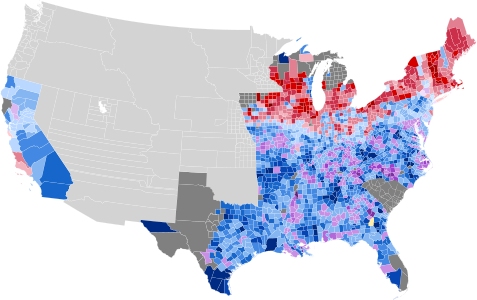1856 United States presidential election
The 1856 United States presidential election was the 18th quadrennial presidential election, held on Tuesday, November 4, 1856. In a three-way election, Democrat James Buchanan defeated Republican nominee John C. Frémont and Know Nothing nominee Millard Fillmore. The main issue was the expansion of slavery as facilitated by the Kansas–Nebraska Act of 1854. Buchanan defeated President Franklin Pierce at the 1856 Democratic National Convention for the nomination. Pierce had become widely unpopular in the North because of his support for the pro-slavery faction in the ongoing civil war in territorial Kansas, and Buchanan, a former Secretary of State, had avoided the divisive debates over the Kansas–Nebraska Act by being in Europe as the Ambassador to the United Kingdom.
296 members of the Electoral College
149 electoral votes needed to win
Slavery was the main issue, and with it the question of the survival of the United States as it then existed. The Democrats were seen as the pro-slavery party; the new Republican party, though hostile to slavery, limited its efforts to the politically more manageable question of the extension of slavery into federal territories (and its removal from the District of Columbia). The nativist Know Nothings (known formally as the American Party) competed with the Republicans to replace the moribund Whig Party as the primary opposition to the Democrats. They emphasized opposition to Catholic immigrants.
The 1856 Republican National Convention nominated a ticket led by Frémont, an explorer and military officer who had served in the Mexican–American War. The Know Nothings, who ignored slavery and instead emphasized anti-immigration and anti-Catholic policies, nominated a ticket led by former Whig President Millard Fillmore. Domestic political turmoil was a major factor in the nominations of both Buchanan and Fillmore, who appealed in part because of their recent time abroad, when they did not have to take a position on the divisive questions related to slavery.
The Democrats supported expansionist slave-holding policies generally of varying intensities. Southern Democrats were all in favor of the expansion of slavery. Some wanted to obtain Cuba as slave territory, as espoused by the Ostend Manifesto. Northern Democrats called for "popular sovereignty", which in theory would allow the residents in a territory to decide for themselves the legal status of slavery. In practice, in Kansas Territory, it produced a state-level civil war. Frémont opposed the expansion of slavery. Buchanan called that position "extremist", warning that a Republican victory would lead to disunion, a then constant issue of political debate which had already been long discussed and advocated. The Know Nothings attempted to present themselves as the one party capable of bridging the sectional divides. All three major parties found support in the North, but the Republicans had virtually no backing in the South.
Buchanan won a plurality of the popular vote and a majority of the electoral vote, taking all but one slave state and five free states. Frémont won a majority of electoral votes from free states and finished second in the nationwide popular vote, while Fillmore took 21.5% of the popular vote and carried Maryland. The Know Nothings soon collapsed as a national party, as most of its anti-slavery members joined the Republican Party after the 1857 Dred Scott v. Sandford Supreme Court ruling. This election marked the end of the Second Party System, 1856 also proved to be the last Democratic presidential victory until 1884, as Republicans emerged as the dominant party during and after the Civil War. As of 2023, this is the only time that the Democrats won the presidency without any electoral votes from New England and the only time that a Republican swept this region without winning the presidency (losing New Hampshire to Woodrow Wilson in 1916 with a margin of 56 votes).
Congressional certification[edit]
During the joint session of Congress to count the electoral votes, a dispute occurred over Wisconsin's slate. The electors of Wisconsin, delayed by a snowstorm, did not cast their votes for Frémont and Dayton until several days after the appointed time and sent a certificate mentioning this fact. When the votes for the state were opened by acting Vice President James Mason, he counted them over the objections of the leadership of both Houses of Congress.[17]
